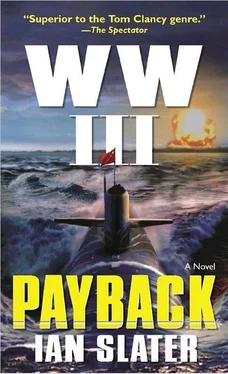“You okay, Aussie?” asked the general, but Aussie couldn’t hear him for the noise. Salvini dug him in the side. “General wants to know if you’re okay.”
“Yeah, I’m okay,” Aussie called out to Freeman.
“Good,” replied Freeman, who then called to Lee, “Can you hear me?”
Johnny Lee could just hear Freeman, the explosion of the rocket-propelled grenade near him, Bone, and Salvini at the northern end of the warehouse having permanently damaged his left eardrum. Freeman told them what had happened to Brady, what he, Freeman, had done. No one had anything to say. It was understood.
After a few more minutes, during which the juddering of the waves against the RS seemed like an endless attack by the sea, Salvini asked, “You want to undo the box?”
“Are you kidding?” said Gomez. “It’s hard enough keeping in my seat.”
“Shove it alongside me,” persisted Sal, tapping the knife that he wore strapped to his thigh. “I’ll cut those metal straps like they’re butter. Bone didn’t get it for nothing.”
“Not in this turbulence,” said Freeman. “Besides, we don’t want to destroy anything that CIA forensics can use—”
He stopped, grabbing the RS’s midline roll bar, so violent was the next set of ten-foot-high speed bumps through which the RS passed like a flying fish between troughs.
It wasn’t that they were heartless men talking about the box, forgetting about Bone’s death, his corpse now floating facedown somewhere in the crescent bay of Beach 5. But once in action, like any professional at work, work came first, lament or regret later when the present danger or problem had passed. Already Gomez had said his Hail Marys and called upon the Holy Mother to be with the soul of his late comrade-in-arms, and Aussie had silently said the Lord’s Prayer. Now Freeman led them all in the Twenty-third Psalm, though he knew Sal, his Catholic upbringing notwithstanding, and Aussie, a lapsed Episcopalian, wandered between agnosticism and qualified catechism.
“Amen,” said Gomez, his eyes having been open throughout the prayer, watching the flat-screen radar display relayed from the pop-up “doughnut” radar just behind the V-shaped bow, all of them depending now solely on the radar because of the unreliability of the smashed mike-fed waterfall screen. “Surface vessel, three thousand yards,” he said. “Bearing zero four four.”
Any prop signature reading was out of the question, the sheer noise of the RS itself negating any input from the damaged sonar mikes.
“Friend or foe?” asked Freeman.
“No flag reading,” replied Eddie, who, with Gomez, was watching the flat screen.
“Dammit!” said Freeman. “Merchant or warship?”
“Looks like a junk. I say again, a junk. About a thousand-tonner.” An assistant RS pilot in training in the international waters of the South China Sea once made the mistake of referring to flotsam seen floating on the surface as “junk,” triggering a massive coordinated fleet action that had consumed thousands of gallons of fuel in response to the word “junk.” Hence Gomez’s emphasis on the article “a.”
“Must be bobbing around like a cork,” said Aussie. “It is,” said Eddie.
“Steer zero niner,” Freeman ordered.
“Steer zero niner,” confirmed Mervyn, who, Sal noticed, had quickly put on his Navy-style watch cap, a move that Eddie made when he anticipated possible trouble.
“Shifting!” Eddie warned them, but nothing had quite prepared them for the hard right to the new course, Sal and everyone else intuitively grabbing hold of their H harness seat belts, the box sliding abruptly toward Johnny Lee, who was sitting right of Salvini.
“Goddammit!” shouted Freeman. “Secure that fucker!”
“Sal or the box?” said Aussie. Everyone was uptight — the mission, with only one fatality on Payback’s team, had gone well, all things considered, thanks in part to the fog along the beach, but no one was in the mood for sharp evasive actions against a fishing junk that might well be a ChiCom listening ship bristling with electronics behind its deceptively fragile-looking bamboo superstructure, each man acutely aware they could yet lose what they believed was the prize.
“Shit!” It was Eddie Mervyn, seeing the smaller blips on the radar’s screen. “They’re putting over RIBs — two of ’em.” He meant rigid inflatable boats.
“Retrieving fishnets?” proffered Choir.
“In this fucking weather?” riposted Aussie.
Freeman wasn’t going to gamble with the team. They’d got the box — a box — and whatever it contained they were taking it home to McCain .
“Engage at will,” he told Mervyn.
“Engage at will, aye, sir,” said Mervyn. If those two RIBs could be seen clearly retrieving nets from the angry sea, fine. But if not, he was going to unleash everything the RS had. “Submerging,” he announced. “Hold on.”
There was a deafening hiss as ballast tanks blew, filling now with a rush of water like scores of cisterns filling at once and quickly, the RS coming to a near full stop. During this eight-second “gut rush,” as it was known, when Payback’s complement underwent sudden deceleration, Choir threw up, the craft, as if on cue from his vomiting, sinking rapidly, bulbous stern first, which now became the bow of the RS’s submersible mode, the entire back-to-front, or as Aussie called it, “ass-up,” maneuver causing Choir to further throw up what little remained in his stomach. “Sorry—,” he said weakly. The automatic swiveling of seats activated by Gomez so they’d all be facing the direction in which the sub was heading drove Choir into a paroxysm of dry retching.
“Up search scope!” ordered Eddie Mervyn, and Gomez complied, the sleek column rising up, Eddie busy punching in DACS, the decoy torpedo’s attack codes, and, as possible backup, the TACS, or the torpedo’s attack codes.
“Scope on-screen,” said Gomez, adding with deliberate emphasis, “It is a junk we’re seeing.”
“Where are the RIBs?” Eddie asked Gomez.
Aussie, in the reverie that more often than not fills one after such a mission, whether it be crossing dangerous borders in a cold war or a live-fire incursion, couldn’t suppress a grin at Eddie Mervyn’s question. He thought “Where are the RIBs?” was the funniest question he’d heard in months.
“Where are the damn ribs?” Eddie again asked sharply.
“On the barbie!” said Aussie.
“What?”
No one laughed, especially not the general, who was making a mental note to upbraid Lewis as soon as they were safely back aboard McCain — if they got back to McCain .
“One RIB zero two five approaching. Second one — behind us — on two seven zero.”
“Drums!” yelled Gomez. “They’re rolling drums!”
“Go deep!” shouted Mervyn.
They felt more than heard the gurgle of water as Mervyn opened the torpedo tubes’ lids during the graceful descent, the meter needle in the fathometer spinning backward. They were going down like a stone. At three hundred feet there was a rush of compressed air.
“Decoy away,” said Gomez. “Tube one.”
“Decoy away,” confirmed Eddie. “Tube one.”
“Tubes two and three ready,” Gomez told him, the SpecFor warriors all watching the search scope’s screen. They were at 350 feet, approaching their crush depth at 450, Mervyn slowing the rate of descent now, the pictures of the storm-tossed surface being relayed to them via the long fiber-optic thread whose buoyant eye, no larger than a human one, surveyed the heaving surface. Because of the profusion of storm-tossed waves, however, the “rolling visibility” pictures were hit and miss, in that one moment they’d have a glimpse of the junk, the next a wall of foam, the next nothing but angry gray sea.
Читать дальше












